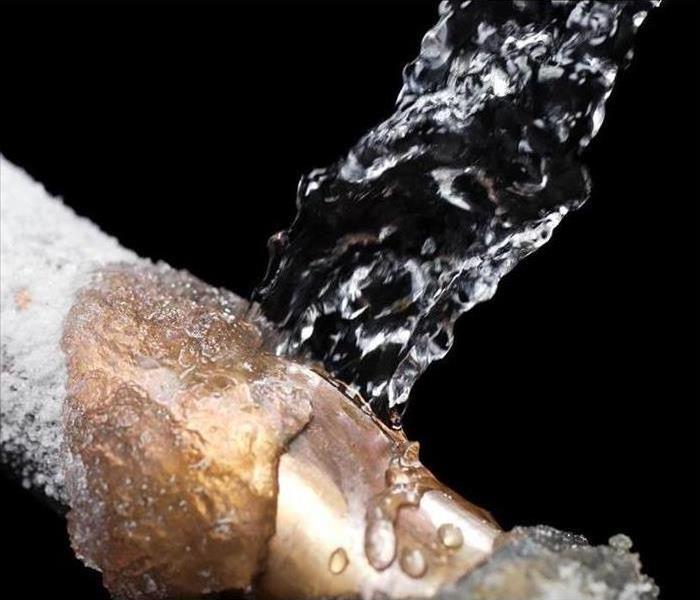Do's and Don'ts When Pipes Freeze
12/7/2020 (Permalink)
Frozen pipes are a common problem for home owners during the winter months. Causing a lot of trouble and havoc in our homes. However, do you know the reasons behind frozen pipes and pipe bursts? Knowing so can help prevent your home’s pipes from freezing and rupturing.
You will be surprised to know the cold weather is not the major reason for frozen pipes! The actual factor is the internal pressure that is built inside the pipes. However, the cold weather does play a role in developing this pressure. The freezing process expands the water molecules into different shapes, in turn, occupying more space within the pipes than what they occupy in liquid state. Because of this expansion, they force water towards an appliance, for instance the faucet, leading to significantly higher water pressure. When immense pressure is developed, the pipe finally freezes or ruptures, resulting in severe water damage.
There is no need to worry about it now, since there are certain ways to minimize the loss. Let take a look at the different ways you can prevent frozen pipe bursts.
Things to do when pipes freeze
- Check uncovered pipes
Check the water pipes outside of your home that are not covered by anything or those placed in unheated areas. Make a list of uncovered pipes.
- Insulation
Insulation of pipes is a proven and well recognized means to avoid pipes from freezing. You should insulate pipes by putting foam on their outer surfaces. A professional home emergency restoration service like SERVPRO of East Meadow / Westbury can help prepare your pipes for winter.
- Covering
For the pipes that are uncovered, put a dome or some other kind of insulating cover on spigots or outdoor faucets. These are readily available at most local hardware stores.
- Water flow
Going away for a few days? This technique really works. Let a little quantity of water to flow or drip through the faucets. It prevents the pressure from building in the pipes. If the weather is extremely cold, it is advised to keep either one or two faucets running slowly all the time. Water passing through the system can prevent the freezing as moving water can’t freeze.
- Heat
Supply some heat to the pipe areas by using electric hair dryer or heating pad. You may also use towels soaked in warm water.
- Air leaks
Examine the air leaks around dryer vents, pipes and electrical wiring. Use insulation or caulk to keep the cold air away from pipes. In extremely cold weather, even the smallest opening may let the cold air enter the pipe, causing it to freeze.
- Pipe section
Make sure you properly examine the section of the pipes between faucet and frozen area. Monitoring the status of pipe is critical to avoid pipe freezing.
Things NOT to do when pipes freeze
Most of the people incur more damage by following the wrong tips. It is advised not to do these things when your home’s pipes are freezing. In addition, if you avoid these things, you can also minimize the chances of pipe freezing.
- Never leave a space heater set up under the home, unattended or turned on. This is extremely dangers and one of the main causes of home fires.
- Don’t use a propane heater, blowtorch, charcoal stove and any open flame device as an insulation or heating mechanism.
- Close faucet or stop water flow until the pipe is thawed completely and the water is able to flow freely
If you have any doubt or not confident in you abilities to execute any of these tips, or you are simply not sure what your are doing, you must call an expert home emergency restoration professional like SERVPRO of East Meadow / Westbury. Frozen pipes don’t always result in ruptures and bursts. If you take precautions on regular basis, monitoring your home’s pipes and taking action when required, you can surely prevent your home from looking like a swimming pool and the consequential water damage restoration expenses.




 24/7 Emergency Service
24/7 Emergency Service
